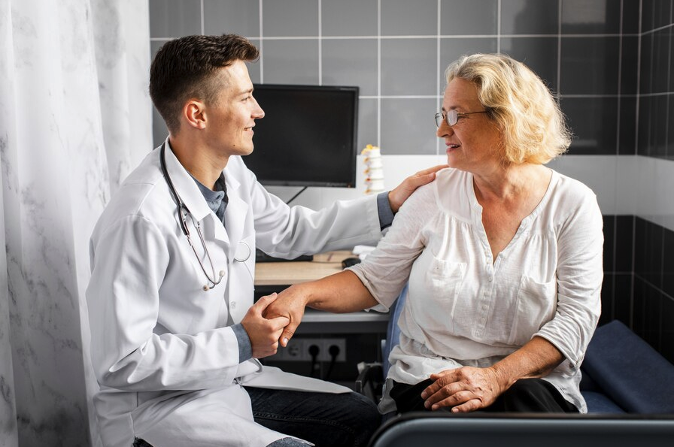
Image: Freepik
Advancements in cancer treatment don't just transform the lives of patients - they can benefit entire communities. As new therapies become available, local healthcare systems grow stronger, offering easier access and creating new job opportunities.
From a community viewpoint, cancer advances can encourage better patient education, provide more resources to patients, and drive public awareness and understanding. In many ways, these advancements build healthier, more resilient communities committed to supporting cancer care efforts.
Thanks to recent advancements, patients have more treatment options. They can choose where to get cancer treatment alternatives that meet their needs and goals, right within their communities. These new options mean less travel and stress for families.
For instance, treatments like immunotherapy and targeted therapy, which are known to be less invasive and pose fewer risks, are becoming more easily accessible at a local level, changing how patients and healthcare providers treat cancer.
Additionally, community hospitals often collaborate with larger research institutions, bringing the latest protocols to your neighborhood.
Surveys highlight that over 60% of cancer patients and survivors find it challenging to afford their care. However, the tide is turning. Advances in cancer treatment have led to more affordable, less invasive options, making care less burdensome.
Local hospitals and clinics are reflecting these changes. Thanks to treatment advances, invasive surgeries are no longer the only options. Instead, patients can choose less invasive treatments that involve reduced recovery times and complications.
In turn, this can reduce several costs for patients, including:
Travel to specialized clinics for treatments and surgeries
Medications
Hospital stays
Missed days at work (e.g.: due to therapies like chemotherapy)
Recovery times
Rehabilitation
Facilities are also shifting their focus toward outpatient treatments and home health care, which cuts costs significantly.
Detecting cancer early increases the chances of successful treatment. Thanks to advances in cancer treatments, new, more affordable, and more accessible screening options have become available at a local level.
Here are some practical tips for early detection available within communities:
Regular mammograms for women starting at age 40.
Yearly prostate exams for men over 50.
Skin checks for unusual moles or spots.
Colonoscopies once you reach 45, repeating every ten years.
Annual pap smears for women by age 21.
Genetic testing if multiple family members have cancer.
Healthy lifestyle choices to lower risk.
These screenings help catch diseases early on and support swift intervention, which can reduce surgery risk, recovery times, rehabilitation, and care costs.
Aside from medical treatment, quality of life plays a crucial role in the healing journey of cancer patients. Senior living facilities provide invaluable support, offering specialized care not just for health, but for overall well-being.
These facilities focus on creating comfortable environments, addressing both emotional and social aspects of recovery. They allow residents to engage in daily activities, fostering a sense of community and continuity. Additionally, integrated medical support teams ensure that health needs are always within reach.
The rise in local cancer treatment facilities is doing more than just offering medical help; it's creating new job opportunities. Hospitals and clinics need not only doctors and nurses but also technicians, administrative staff, and cleaning personnel. Even roles in research have emerged, allowing residents to contribute to groundbreaking work right in their neighborhoods.
Additionally, other job opportunities are fuelled by the need for support services like transport and home care. These jobs not only provide income but also build a sense of purpose and fulfillment among community members.
Awareness plays a pivotal role in how communities understand and tackle cancer. Here are just some strategies that recent advances in cancer prevention and treatment campaigns may use:
Health fairs and community workshops to educate people on symptoms, treatment options, and preventive measures.
Schools and universities may incorporate cancer education in their courses, inspiring young minds to contribute to future breakthroughs.
Online platforms and social media campaigns can provide invaluable, accessible information, reaching a broad audience easily.
Facing cancer isn't just a medical challenge - it's a personal journey for patients and their families. Support networks, such as local groups or online forums, offer indispensable emotional resources. They provide a space for sharing experiences, advice, and encouragement.
For example, at a community level, churches, community centers, and various non-profits are stepping in to offer both material and emotional assistance.
Additionally, peer support can have a profound impact, helping family members manage stress and care for themselves while caring for their loved ones.
Communities that support cancer research organizations create a win-win scenario. By participating in fundraising activities like walks, marathons, or online crowdfunding, communities not only raise money but also raise hope. These funds enable researchers to pursue groundbreaking studies that lead to new treatments and cures.
With this approach, everyone benefits - from patients who receive advanced care to local residents who see the impact of their contributions in tangible improvements.